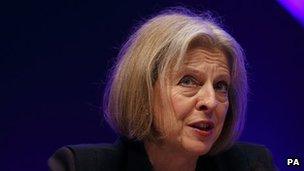Police forces facing dozens of new performance targets
- Published
- comments

The elected crime commissioner scheme was one championed by Theresa May
Police forces in England and Wales have been set 178 performance targets by police and crime commissioners, despite a Home Office vow to cut red tape.
Last week Home Secretary Theresa May told senior police officers they "have only one target, to reduce crime".
BBC analysis shows 18 of the 41 PCCs have set targets or performance measures and others broader objectives.
The Association of Police and Crime Commissioners said the targets bore "no resemblance" to past government goals.
In a reform championed by Mrs May, PCCs were elected in all police force areas outside London last November to replace police authorities.
They are responsible for setting a strategy for each force and holding chief constables to account. In the capital the mayor of London takes on the responsibilities of PCCs.
'Targets comeback'
Addressing last week's police superintendents' conference, the home secretary said she had got rid of action plans and would not micro-manage what individual forces got up to, but warned that she had noticed targets "making a comeback".
The BBC examined police and crime plans, which all PCCs have to publish, as well as associated documents on their websites.
The extent of the performance targets and the language used to describe them varies significantly from one force to another.
Bedfordshire refers to "priorities" but lists no specific targets, whilst Cambridgeshire has a wide range of measures, including reducing burglaries, increasing victim satisfaction and improving the ratio of reported incidents of domestic violence to the number of prosecutions.
One of the objectives set for the Norfolk force is to reduce violent and sexual crimes at specified times of night, in patrol zones of certain towns, to no more than 450 crimes per year by 2015-16.
Leicestershire's 26 targets - the most of any force - are to be measured by satisfaction surveys and crime figures.
Meanwhile, Thames Valley Police has been set 10 crime reduction targets. These include a commitment to carry out at least 40 operations against metal theft and to "disrupt 20 problem and organised crime groups that prey on vulnerable people and isolated communities".
The four police forces in Wales have not been set specific targets, but the PCC for the South Wales force refers to targets that are to be set in general terms.
Local priorities
Mrs May has consistently spoken out against police targets and performance measures.
In May 2010, she told the Police Federation she would "look at dismantling the targets in disguise - the key performance indicators - which set national, one-size-fits-all priorities for local forces and instead allow you to pursue the crimes and criminals you believe you should".
A year later she told the Conservative Party conference that she "hadn't asked the police to be social workers... I've told them to cut crime" and earlier this year she told the Police Federation that she had "got rid of Labour's plethora of targets".
Tony Lloyd, Greater Manchester Police and Crime Commissioner and chairman of the Association of Police and Crime Commissioners, said PCCs worked closely with communities to identify what most concerned them about crime.
He said: "Police and crime plan objectives bear no resemblance to previous central government targets. Police and crime commissioners put their draft five-year plans out for public consultation and used the comments they received back to shape local priorities to fight crime.
"Police and crime plans are designed to reflect the views of local people and not constrain police officers from cutting crime."
- Published10 September 2013
- Published22 August 2013
- Published16 November 2012